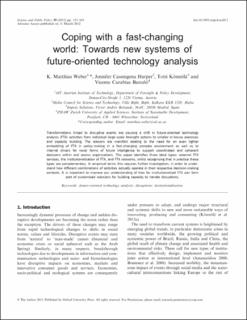Bitte benutzen Sie diese Kennung, um auf die Ressource zu verweisen:
https://doi.org/10.21256/zhaw-1986| Publikationstyp: | Beitrag in wissenschaftlicher Zeitschrift |
| Art der Begutachtung: | Peer review (Publikation) |
| Titel: | Coping with a fast-changing world: towards new systems of future-oriented technology analysis |
| Autor/-in: | Weber, K. Matthias Cassingena Harper, Jennifer Könnölä, Totti Carabias-Hütter, Vicente |
| DOI: | 10.21256/zhaw-1986 10.1093/scipol/scs012 |
| Erschienen in: | Science and Public Policy |
| Band(Heft): | 39 |
| Heft: | 2 |
| Seite(n): | 153 |
| Seiten bis: | 165 |
| Erscheinungsdatum: | 1-Mär-2012 |
| Verlag / Hrsg. Institution: | Oxford University Press |
| ISSN: | 0302-3427 1471-5430 |
| Sprache: | Englisch |
| Schlagwörter: | Future-oriented technology analysis; Disruption; Institutionalisation |
| Fachgebiet (DDC): | 303: Soziale Prozesse |
| Zusammenfassung: | Transformations linked to disruptive events are causing a shift in future-oriented technology analysis (FTA) activities from individual large-scale foresight actions to smaller in-house exercises and capacity building. The reasons are manifold relating to the need for an even tighter embedding of FTA in policy-making in a fast-changing complex environment as well as to internal drivers for novel forms of future intelligence to support coordinated and coherent decisions within and across organisations. This paper identifies three ideal types: external FTA services, the institutionalisation of FTA, and FTA networks, whilst recognising that in practice these types are complementary. In empirical terms this requires further investigation, in order to understand how different combinations of activities actually operate in their respective decision-making contexts. It is important to improve our understanding of how far institutionalised FTA can form part of customised solutions for building capacity to handle disruptions. |
| Weitere Angaben: | Erworben im Rahmen der Schweizer Nationallizenzen (http://www.nationallizenzen.ch) |
| URI: | https://digitalcollection.zhaw.ch/handle/11475/6839 |
| Volltext Version: | Publizierte Version |
| Lizenz (gemäss Verlagsvertrag): | Lizenz gemäss Verlagsvertrag |
| Departement: | School of Engineering |
| Organisationseinheit: | Institut für Nachhaltige Entwicklung (INE) |
| Publiziert im Rahmen des ZHAW-Projekts: | IFA International Foresight Academy |
| Enthalten in den Sammlungen: | Publikationen School of Engineering |
Dateien zu dieser Ressource:
| Datei | Beschreibung | Größe | Format | |
|---|---|---|---|---|
| 2012_Weber_Coping_with_a_fast-changing_world.pdf | 223.24 kB | Adobe PDF |  Öffnen/Anzeigen |
Zur Langanzeige
Weber, K. M., Cassingena Harper, J., Könnölä, T., & Carabias-Hütter, V. (2012). Coping with a fast-changing world: towards new systems of future-oriented technology analysis. Science and Public Policy, 39(2), 153–165. https://doi.org/10.21256/zhaw-1986
Weber, K.M. et al. (2012) ‘Coping with a fast-changing world: towards new systems of future-oriented technology analysis’, Science and Public Policy, 39(2), pp. 153–165. Available at: https://doi.org/10.21256/zhaw-1986.
K. M. Weber, J. Cassingena Harper, T. Könnölä, and V. Carabias-Hütter, “Coping with a fast-changing world: towards new systems of future-oriented technology analysis,” Science and Public Policy, vol. 39, no. 2, pp. 153–165, Mar. 2012, doi: 10.21256/zhaw-1986.
WEBER, K. Matthias, Jennifer CASSINGENA HARPER, Totti KÖNNÖLÄ und Vicente CARABIAS-HÜTTER, 2012. Coping with a fast-changing world: towards new systems of future-oriented technology analysis. Science and Public Policy. 1 März 2012. Bd. 39, Nr. 2, S. 153–165. DOI 10.21256/zhaw-1986
Weber, K. Matthias, Jennifer Cassingena Harper, Totti Könnölä, and Vicente Carabias-Hütter. 2012. “Coping with a Fast-Changing World: Towards New Systems of Future-Oriented Technology Analysis.” Science and Public Policy 39 (2): 153–65. https://doi.org/10.21256/zhaw-1986.
Weber, K. Matthias, et al. “Coping with a Fast-Changing World: Towards New Systems of Future-Oriented Technology Analysis.” Science and Public Policy, vol. 39, no. 2, Mar. 2012, pp. 153–65, https://doi.org/10.21256/zhaw-1986.
Alle Ressourcen in diesem Repository sind urheberrechtlich geschützt, soweit nicht anderweitig angezeigt.